Notes on Grief: How For Those I Love’s David Balfe Created 2021’s Best Album
After David Balfe lost his best friend to suicide, he wrote about its impact under the moniker For Those I Love. RS UK follows the Irish musician on his first tour to witness the cathartic impact his project has on people who are grieving or struggle with suicidal ideation
By Hannah Ewens
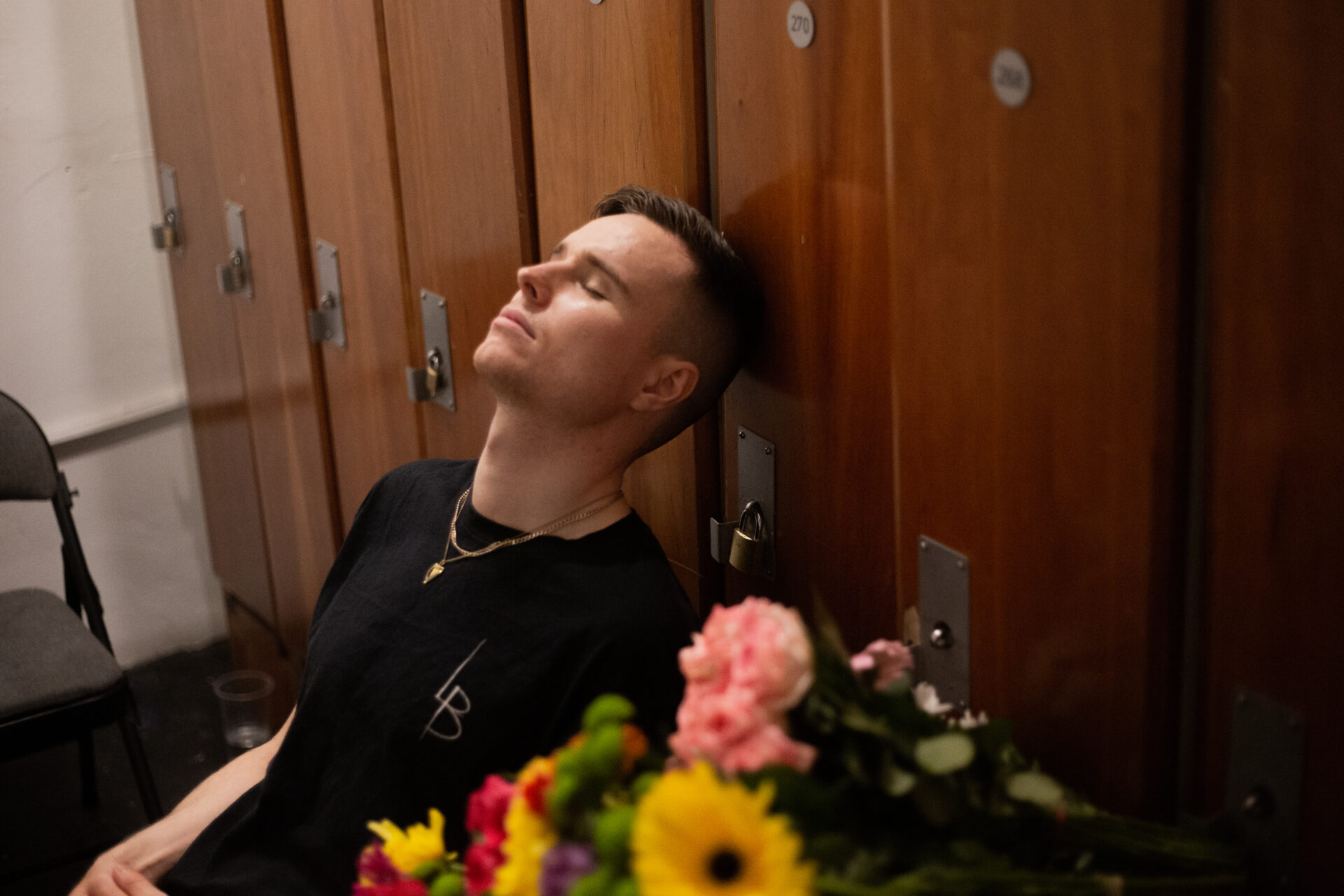
Onstage, David Balfe has both the grace of a poet and agitated fervour of the hardcore bands of his youth. We are inside the tornado of grief with him when he turns his back to watch the footage he edited. It’s an invitation to time-travel through the years 2006 to 2017. Balfe, poet and fellow musician Paul Curran and their mates are scrappy, heavy-fringed kids playing local venues and joking about in the back of vans. They jostle and cheer at football matches, oblivious of the camera. There’s heart and humour in each moment, keenly felt when Balfe is in a carpark at night in front of an empty trolley, headbutting an oncoming football. The ball is thrown into the air and lands perfectly in the child’s seat of the trolley. It’s either a miracle or the result of skill that only happens when nobody’s watching.
When Balfe lost Curran to suicide, his sense of self disappeared, too. “Our identities were laid in cement alongside each other,” Balfe says of his best friend and creative collaborator. “I didn’t know who I was any more without him when the person I was lay in tandem with him for so many years, day in and day out.” Their friendship was intoxicating, allowing Balfe to access an almost-romantic love for him and their shared tightly knit group. Curran felt endless: there was always something new to be learned from him and about him. In that endlessness was hope for a better future.
For now, the past is important and foregrounded in Balfe’s mind. One memory from the day of Curran’s funeral sticks out. A vaguely familiar man approached him sheepishly. The man wanted forgiveness: he was sorry for how he treated Balfe at school, he had changed, yet carried guilt and shame about his former behaviour. Balfe couldn’t remember what this young man had done to him, but the admission was impactful in the wake of Curran’s death for myriad reasons. Namely, shame was everywhere: Balfe and their friends felt that they had failed as comrades. “We were lost in this lack of understanding of what could have led to that day with Paul,” he remembers. “It’s something that we’ll never know because you can never know, you can never be there to relive those last hours.”
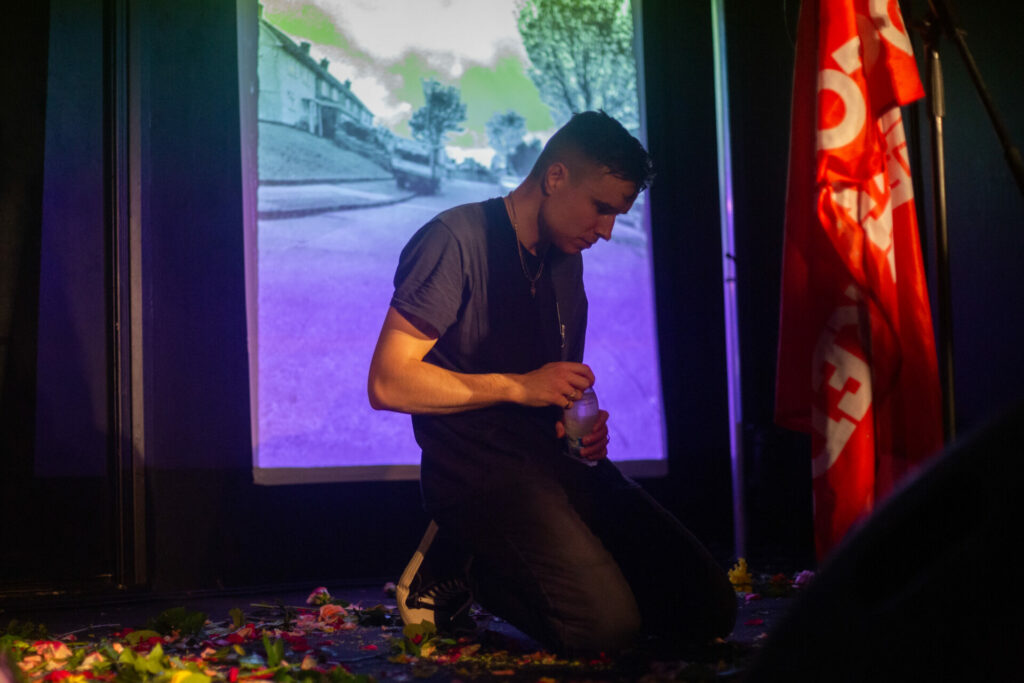
For boys growing up in working-class communities in northern Dublin, the expectation is to embody a hard, icy masculinity. Under the weight of that expectation and the reality of poverty, 30-year-old Balfe spent his twenties observing a two-fold transformation in young men, like the one who approached him at the funeral that day. “People who were hard have opened up – like him – but people who were soft have become hard through difficult decisions and survival and no option for them to provide a stable environment for them and loved ones.”
The sum of these observations and more are contained in a self-titled album Balfe released in early 2021 under the moniker For Those I Love. It is a eulogy of sorts for his friend and cathartic documentation of the grieving process from sharp, dizzying pain to piecing together a new identity. The context matters: Balfe’s melodic spoken-word vocals over sample-heavy electronica depict substance addition, deprivation and gang violence against the backdrop of their hometown. On ‘Birthday / The Pain’, Balfe opens with a chilling remembrance: “Body dumped on me road / When I was six”. Elsewhere, flames destroy cars outside housing estates and ravers dance for joy. Others see no other option but to turn to the cheapest drugs. “It’s numbers / and stats / Til it’s your life,” he warns on ‘Top Scheme’. Death and grief are unavoidable results of the area’s destitution.
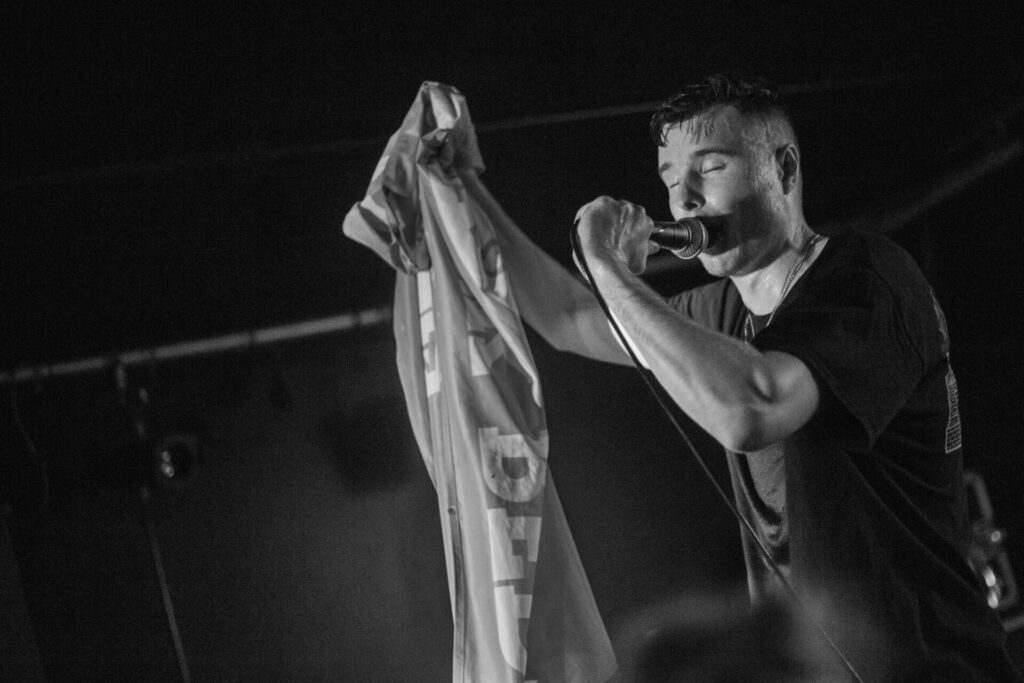
The self-titled record was never intended for public release. It existed quietly on Bandcamp where friends and family could access it. When Ash Houghton, an A&R at September Records, found the music and asked if he would take it down and release it officially, Curran’s family and their joint friends urged Balfe to share the project with the world. First came widespread critical praise and a number two spot on the Irish albums chart. Soon after, his social media inboxes were heavy with messages from people unburdening themselves to Balfe. He used to reply individually to people, but the conversations were dark and unhelpful for his recovery. Recently he began to quietly acknowledge he has read each message. Now, on his first and fleeting tour with the project, the impact it has made on people dealing with grief, addiction and suicidal ideation is visible offscreen.
It is mid-afternoon ahead of the first of three shows at London’s Courtyard Theatre. Balfe sits in the basement of a nearby cafe and describes scenes from the opening night in Scotland two nights ago. Burly Glaswegian men in their forties queued afterwards to hug him, sob with him and share their stories. It’s an unusual response to a live show but if you’ve listened to the album from start to finish, you’ll understand. “It was very intense, beautiful and strange,” Balfe reflects, sipping quickly from a black coffee. “It’s odd that these people are having that sort of response to something I’ve done, as opposed to just the project which feels like an isolated, monolithic thing.” He’s unsure how he feels about the in-person outpouring; whether it’s healing or harmful for him.
Everything Balfe says is considered but speculative. He has no conclusions. His hands slowly play chords on an invisible piano as he articulates what he’s been learning. These three nights will be a different experience to Glasgow, he thinks. “I will have more of an opportunity to find a pre- and post-show ritual and time to reflect on all this. Three nights in the same place will help me build a sense of comfort, especially after the past year and a half that’s been so isolating.” Back in Dublin, people are still living in a phased lockdown.
His emotional and philosophical outlook on life is singular. In secondary school, he and Curran outwardly showed the same cold-hearted masculinity as their peers. As they got older, their sensitivity and who they were privately together began to emerge. The inseparable pair played in hardcore bands together throughout their teens. By college age, their parents had saved enough for them to both study at undergraduate level: Curran to read literature and Balfe to study fine art. “I certainly went through college with a bit of a venomous view; I was ‘fuck you’ to everybody,” says Balfe. “I wanted to do better than everyone because I knew what a sacrifice it was for me to be there. Paul had the exact same view of college; he knew it was a gift to be educated in something you’re interested in. You never take the piss.”
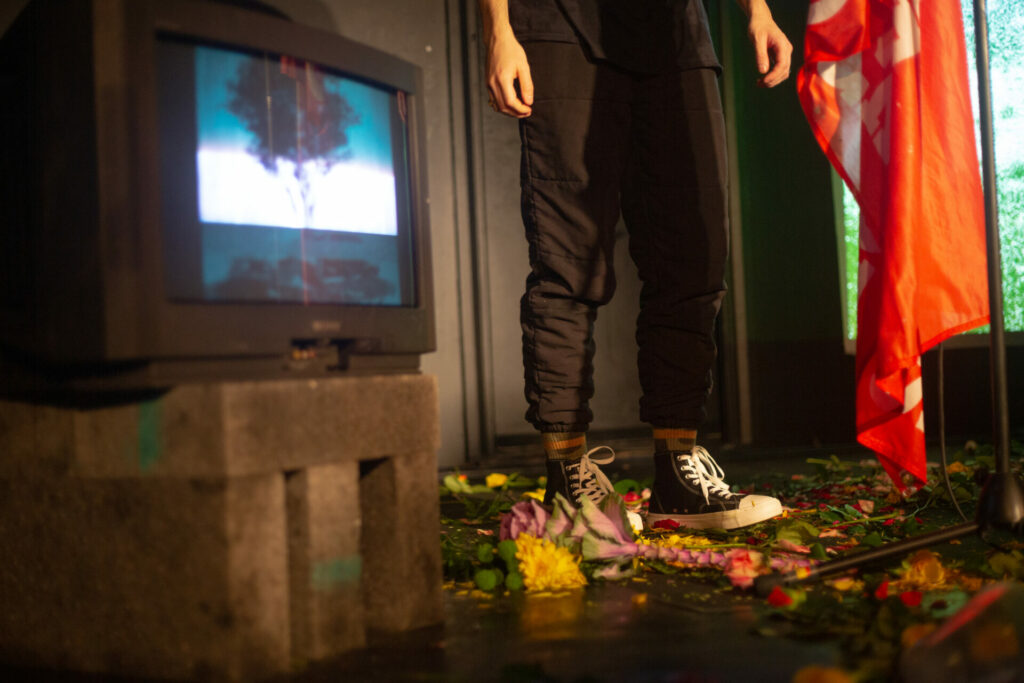
Balfe considers higher education in the arts an escape many of his friends and contemporaries lacked. “I wonder whether our parents saw the road that many of our peers were going down and thought anything that has a trajectory different from that must be a good thing.”
When Curran died, Balfe told their gathered friend group they shouldn’t pull out the whiskey. “One of the first things that came to mind when I heard the news was ‘don’t drink, because it’s only going to exacerbate every feeling and make things worse every day.’” Two months later, he ignored his instincts and began what he calls the typical man grieving thing (“I went on the piss for six months”). He drank with strangers for the total relief of anonymity. Invitations to do so with friends were declined (“It’s so different to drink with friends: you all get closer and closer, and the thoughts get darker and darker and it’s so easy for someone to throw a grenade into the middle of it.”). Eventually he stopped boozing with anyone and realised it was easier, more efficient to drink alone. He drank in the mornings before work out of a degree of dependency and again when he returned home.
The cliché is that we drink alcohol to numb our feelings, but Balfe is convinced that he did so to feel something, to hammer away at the numbness. “At the beginning it felt like I was looking out for everybody and then you realise ‘I’m making shit harder for everybody else, everyone’s getting these incomprehensible intoxicated voice notes from me every night at three in the morning’.” Sustained concern from loved ones started to register until finally one specific message hit harder. Balfe switched on his computer and returned to an electronica project he’d been working on prior to Curran’s death, which was an ode to their friends and family, all those he loved. It wasn’t until he had traditional forms of help – therapy, an attentive doctor, the right medication and had reduced the amount of dissociative alcohol he was drinking – that he was able to rework and finish the project and see it as an embodiment of how he felt after Curran’s death.
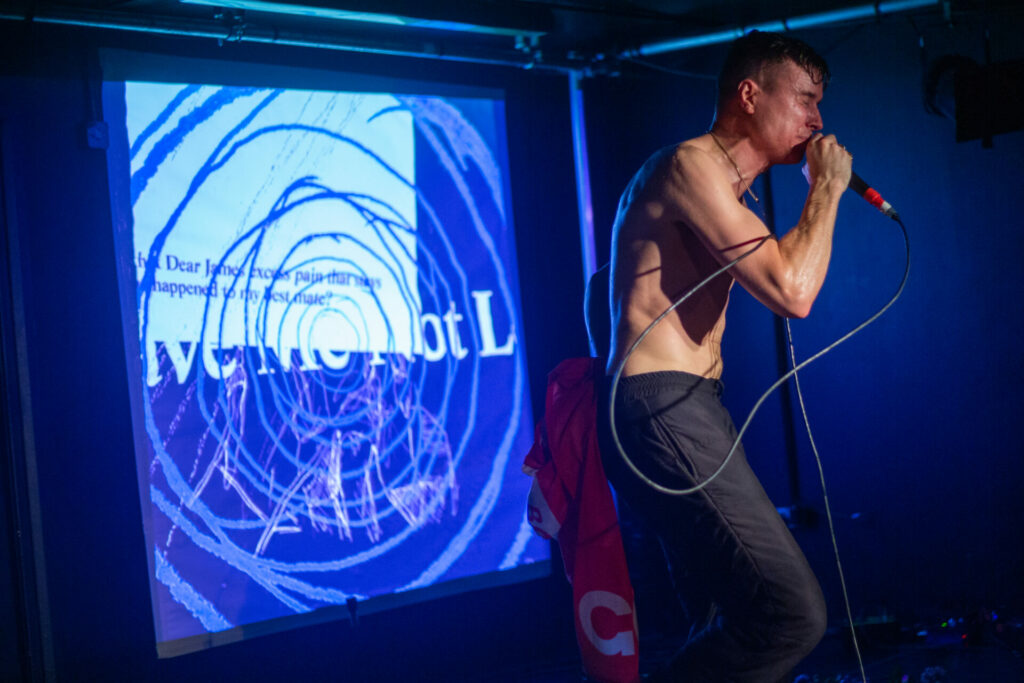
He still feels guilty. “I can afford to do counselling. I harbour guilt because Paul wasn’t able to do this, my peers aren’t able to.” He notes that four of his peers rang a hotline for those dealing with suicidal ideation or the loss of loved ones to suicide. Their answerphone pleas for help were never answered. The guilt – like the grief – is cyclical. “All that’s happening is I’m better equipped to deal with the different stages when I cross them,” he says, draining the last of the coffee.
That first night in London, Balfe repeatedly pulls off the red football flag tied to the mic-stand and wraps it around his neck or holds it in both hands like a promise. The heat in the room from emoting bodies is unbearable; Balfe responds by taking his top off. The mic cord is wrapped around his sweating neck, veins screaming, as he shouts: “Don’t ask me ‘am I next’?” At the end of the performance, he storms out through the door at the back of the stage. The flowers on the floor are petals and broken stems, crushed by the pacing of their owner.
The following day, hours before the second Courtyard performance, Balfe is in bright spirits. He feels more positive than after the Glasgow show, just now realising how he struggled to bring himself back from the “pit of sadness and grief” after speaking with those men. Although similar discussions occurred last night, he is satisfied with that. “These conversations offset the guilt of releasing the project,” he says, spreading back into an armchair in the venue’s bar. “I feel like there’s a penance due and part of it is going out after the show to speak to people and respond to people’s body language.” That feels safer for everybody involved than the social media messages.
Balfe speaks near-continually of guilt. Interviews contribute to that, along with the project itself and its success. “I feel the guilt because there’s an element of personal benefit that I receive from speaking about a tragedy that happened to my best friend and it puts not just his laundry in the street but also that of my peers, of our shared circle, of family. Thankfully these are the same people who are encouraging me to do it.”
When remixing and mastering the music and creating the visuals for the live performance, it was vital to Balfe that he balance the light and dark of grief and survival. The archival footage was intended to provide a sense of celebratory love, to remind the audience of friendship. He believes the balancing act was successful but is open to the worrying alternative. “I would feel very different about it all if I felt people were leaving with a heavier burden,” he says, suddenly quite solemn.
The football flag belonged to Curran; it is something of a talisman for their friendship group. If any of them has an event of significance, they’ll take it with them. These shows are, of course, such an event for them all. “It allows us to feel that connection to Paul and it speaks to a sense of unity. It’s representative not only of what we lost but of what we gained in surviving.” A lifelong Shelbourne FC fan, Curran seemed at his most carefree when watching a match at their home grounds of Tolka Park. After his passing, Curran’s ashes were scattered on the grounds and club and supporters gathered around to help his friends and family. Tragically another Shelbourne fan, Curran’s age, also died in the same way on the same day. Balfe has never been able to rationalise this strange and painful occurrence in his mind.
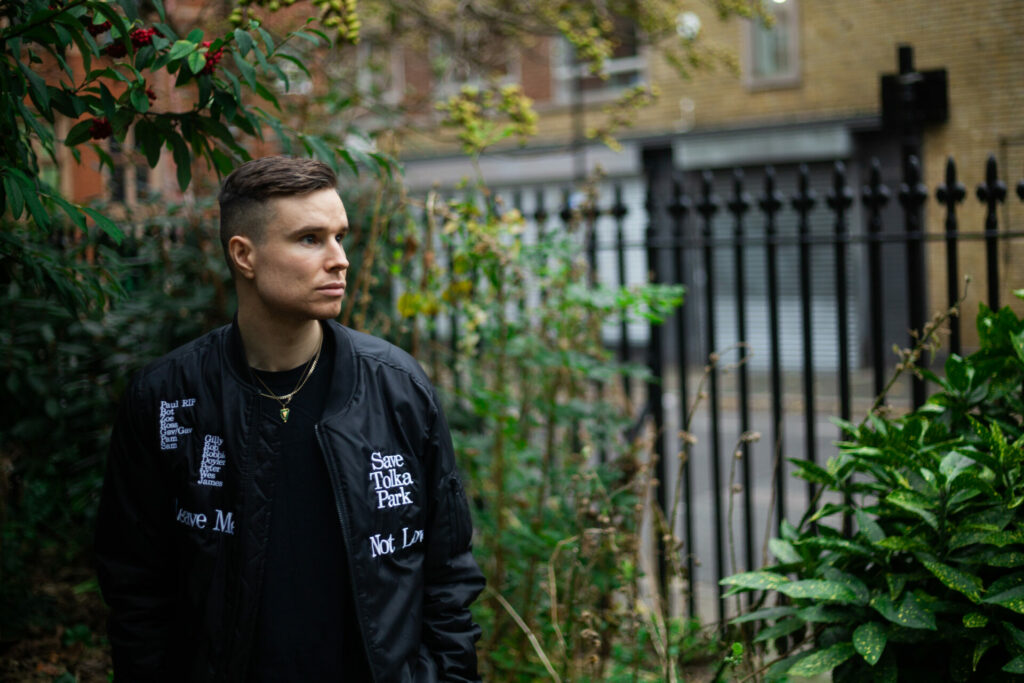
Tolka Park – whose name is emblazoned on the jersey Balfe wears onstage for this tour – is currently under threat from developers who want to turn it into luxury flats. “In the months after Paul died, going to those matches was the only time I felt a sense of escape. Wasn’t haunted by my feelings. Ninety minutes of investing everything into other people,” he says. In response, he has joined a collective of political organisers and locals of various expertise in fighting to save the club. “On a personal level, I wouldn’t be able to see Tolka Park be bulldozed. You wouldn’t do it to a cemetery. I’ll be chaining myself to the gates and I won’t be the only one but hopefully it won’t get that far.”
From the activism to his performance, everything is fuelled by the DIY ethics Balfe learnt in the hardcore scene. The approach remains the same: “If I can learn how to do it, I will do it”. More For Those I Love music has been written, despite suggestions that surely this is the only record. New songs won’t be about the loss of his friend, but similar themes will be explored. “I’ve never been sure where the sharp edges of this project lie,” he says, because his personal grief and For Those I Love are inextricably linked. “Grief doesn’t have an end point; it just evolves and changes and there’s no final chapter.”
Besides a release show, Balfe and Curran never wanted to play shows with their last band Burnt Out. Their one exception would be if Jools Holland rang asking for them to perform. As fate conspired, one of the few performances Balfe gave before this tour was Jools Holland. “It was a total fucking fantasy,” he smiles. “We’d just sit around and say we’ll do this, we’ll do this, and we’d just live in the fantasy. Because living in the fantasy is as good as it gets. And it’s enough at the time, just as long as you have hope.”
That second night at the Courtyard, Balfe continues to smile. Each movement, the delivery, is different from the night before – the words spew organically from him. A group of lads in black T-shirts are on the front row. It is evident Balfe knows one of them. He dives down to hug his friend hard, both two-stepping in the embrace. When Balfe leaps back onto the stage, he grins with what appears to be relief. “I can feel it in this room / I can feel it in this room,” he screams, repeating the words again and again.
Multiple people in the crowd are crying – one man in a band t-shirt is sobbing like this is a collective exorcism – and Balfe’s mate is smiling at the video playing behind the singer. I suspect everyone can feel the pain in the room – drawn out by what we are all sharing, it crackles in the air, thunder threatening to break – but that pain is unequivocally matched by something like hope.
If you are struggling with suicidal ideation, help is available. You can call Samaritans on 116 123 or the National Suicide Prevention Helpline UK on 0800 689 5652.
